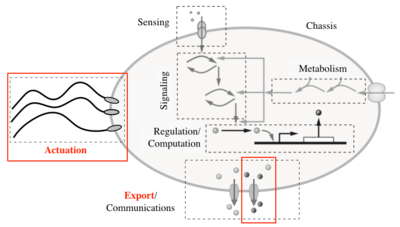Actuation of Synthetic Cells Via Proto-Flagellar Motors
This project focuses on the development of functioning molecular motors for micron-scale synthetic cells, demonstrating mechanisms for motility in (synthetic) cellular systems. Recent advances in the fields of synthetic biology and molecular sciences have substantially advanced the ability to produce genetically-programmed synthetic cells and multicellular machines from molecular components. These efforts provide techniques for the bottom-up construction of cell-like systems that can provide scientists with new insights into how natural cells work, harness the power of biology to create nanoscale, biomolecular machines, and provide an exciting pathway for exploration of the Rules of Life. This project considers the "actuation" subsystem of a synthetic cell, with the goal of allowing expression of membrane-integrated actuation complexes that can serve as a starting point to modulate the motility of the cell. The project engages undergraduate students from the Summer Undergraduate Research Fellowship (SURF) program at California Institute of Technology and establishes collaborations between the US Build-A-Cell consortium and Imperial College, London, that includes personnel exchanges to build stronger international ties.
Project participants:
|
Collaborators:
|
Objectives

Our work is split into 4 high-level objectives:
- Construct vesicle systems capable of reconstituting functioning proto-flagella for motility of synthetic cells;
- Controllably engineer new vesicle systems capable of integrating protein complexes expressed in a transcription-translation system into lipid bilayer systems;
- Demonstrate control over motility using the technology from (i) and (ii) to provide internal expression of the actuation complexes and their inducible regulators;
- Provide opportunities for participation in synthetic cell collaboration networks (such as Build- A-Cell), undergraduate research projects, and international collaborations as integrated parts of the research activities.
References
None to date
Research supported by the National Science Foundation award number 2039277.
|
|
|